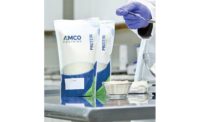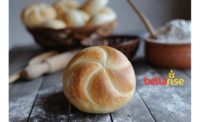Bakery manufacturers have the challenge to make sure they are delivering high-quality products while still producing requisite quantities of these products in an efficient manner. However, consumers continue to demand cleaner, simpler ingredient statements for the snack and bakery products they buy.
Lesaffre, Milwaukee, WI, recently conducted some proprietary clean-label research. The study showed about half of consumers are interested in buying bread and other baked goods with clean labels. Delivering on this promise poses quite a challenge to bakers.
“Dough conditioners play a critical role in the quality of baked goods, and conventional options are hard to replace because they are versatile and provide consistent results,” says Bill Hanes, VP marketing and strategy, Lesaffre. “On the other hand, clean-label alternatives can be sensitive to temperature, bake time, pH, and other environmental factors of each bakery. Finding a clean-label solution that provides the same functionality and end-product quality can be a challenge.”
According to Anita Srivastava, Ph.D., CFS, senior technical service manager, bakery, Kemin Food Technologies, Americas, Des Moines, IA: “Baked good quality is highly dependent upon ingredient quality, formulation, and process conditions. Any variation in any of these parameters, such as wheat flour variations, mixing procedures, baking time, etc., will affect the quality of the finished product. Dough conditioners play a very important role to compensate for these minor process or ingredient variabilities.”
Dough conditioners can include any baking ingredient that improves the production and/or consistency of the dough, adding different agents to deliver the desired outcome. Some common classes of dough improvers include:
-
Reducing agents that break down the protein network in dough and restructure the gluten, reducing required mixing and proofing times
-
Enzymes that break down certain molecules in the dough and feed the yeast to expedite proofing
-
Oxidants to strengthen dough through better gluten formation
-
Emulsifiers to consolidate the gluten and build dough tolerance to handling
ENZYMES AND COMBINATIONS
Puratos, Pennsauken, NJ, has been working to create new dough conditioners focusing on enzymatic solutions. The company has put a strong emphasis on enzyme-based clean-label solutions for improved freshness, texture modification, dough machinability, and more.
Most recently, Puratos launched the Intens line, which provides an interesting approach to address dough conditioning systems, notes Sean Hart, R&D manager, bakery, mixes, and improvers. “Our Intens line is modular improvers, designed to address a single dough conditioning need, without having to modify our customer’s base formula. We have our Intens Fresh line for extended shelf life, Intens Resilience for increasing resiliency in buns and breads, Intens Soft for giving breads a tender bite, and many other solutions, as well.” These new dough conditioners are suited to almost all yeast-leavened breads.
Lesaffre has a broad portfolio of solutions to address every stage of the bakery process, whether a manufacturer is looking to reduce mixing time, improve shelf life, increase loaf volume, or achieve higher uniformity, notes Hanes. Some newer options include:
-
Saf-Pro StarZyme STR 601, an enzyme blend for dough strengthening, provides additional tolerance with existing dough improvers without the use of DATEM, ascorbic acid, or azodicarbonamide (ADA)
-
Saf-Pro Improver Frozen 3.1 and Saf-Pro Improver Freezer to Oven 3.1, clean-label enzyme technologies that are ideal for frozen unbaked dough or freezer-to-oven croissants, Danishes, brioche, and baguettes
-
Saf-Pro Organic Volume 3.2, an organic solution for improving dough strength and volume
-
Saf-Pro Softness 3.2 +V, an option that provides shelf-life and some dough strength
Tillasoft is part of the Kemin portfolio of dough conditioners made using a combination of enzymes and hydrocolloids. “Our Tillasoft line is our range of dough conditioners and softeners for flour tortillas to improve dough softness and extensibility of tortillas. The product can help delay the retrogradation process to help keep tortillas fresh. These ingredients provide improved handling, machinability, extended shelf life, and cleaner-label options, and our delivery method will also address some of the operational concerns when it comes to ingredient additions,” shares Srivastava. Tillasoft product line was designed for flour tortillas, flatbreads, and regular leavened breads.
Maggie Kellenberger, research and development, Thymly Products Inc., Colora, MD, notes bakers must strike a balance between quality and quantity when looking to improve baked goods. “Businesses are always looking to improve physical characteristics, whether that be with a longer shelf life, mold inhibition, or sensory aspects relating to crumb and mouthfeel,” she says. “Similarly, reducing production time by improving dough handling and decreasing fermentation time can help aid quantity. Because increasing quantity without decreasing quality go hand in hand, using one of many in the broad range of dough conditioners can aid in getting both without sacrificing either.”
Thymly Products recently launched Thymly Phresh Beta, a new maltogenic amylase-based dough conditioner designed for low-pH doughs such as sourdough and ciabatta. Thymly Phresh Beta can help delay undesirable staling in dough and, depending upon the usage rate, can offer anywhere from two to three weeks of shelf life. “Additionally, Beta aids in increasing overall consistency in crumb structure, as well as softness, to promote a more-uniform product overall,” notes Kellenberger.
Thymly also offers a new line of Quick Doughs. “Thymly’s Quick Dough utilize enzymes, specifically amylase and lipase, to act as catalysts to reduce fermentation time by half or more,” says Kellenberger. “In addition to enzymatic activity, our Quick Doughs include our Ready Thym Sponge, a blend of emulsifiers to aid in decreasing development time. Quick Doughs act as a base for various bread types, so that the only additions necessary are liquids and flour at the bowl. With the use of these enzymes and emulsifiers in the bases, multiple-step proofing, sponges, folding, and bench rests are removed in the manufacturing steps altogether.” Available bases currently include brioche, ciabatta, and focaccia, with naan and sourdough coming soon.
Cargill, Minneapolis, spent two-years testing and validating a new clean-label solution using a combination of the company’s premium lecithin products and select enzymes to replace legacy dough conditioners. “Lecithin, along with the proper enzymes, will allow you to replace monoglycerides and DATEM,” explains Tim Christensen, certified master baker. “To replicate the functionality of the legacy dough conditioners, neither enzymes nor lecithin, on their own, will do all that is needed, but the combination works together to completely replace DATEM and monoglycerides in breads and rolls. Lecithin is widely used in bread formulas because of its other functional roles, which would include enhancing dough release, increasing loaf volume, ensuring uniform crumb texture, and improving high-speed slicing. The enzymes do much of the shelf-life extension, but lecithin does play a part in shelf life, just as DATEM and monoglycerides do.” Cargill offers plant-sourced lecithin from sunflower and canola as options that perform comparable to soy lecithin but do not have to be declared as an allergen and are Non-GMO Project verified.
AB Mauri North America, St. Louis, recently launched several new dough conditioners. Troy Boutte, vice president, innovation, bakery ingredients, describes the features and benefits:
-
Qualitase L-Cysteine Relax 80, a powdered dilution of cysteine, designed for relaxing doughs for better machinability, and is also used for reducing mix time—suitable for a wide range of yeast-raised baked goods
-
Fermentase Par C Powder 120, a powdered dilution of ascorbic acid, provides dough strength, mechanical shock resistance, crumb grain improvement, and volume improvement—suitable for a wide range of yeast-raised baked goods
-
Organic Rotox 1200 ACP, an organic dough conditioner containing acerola cherry powder as the source of its ascorbic acid
-
Organic Rotox 1100 AF, an organic dough conditioner that is free of ascorbic acid
These organic dough conditioners are designed to be complete systems for improving: dough handling, dough strength, resistance to mechanical shock, crumb grain, symmetry, and volume. They are approved for use in organic products.
ADVANCED DOUGH CONDITIONERS
Corbion, Lenexa, KS, has been working to create robust, functional dough improvers, ranging from complete multipurpose improvers to customizable, segmented components. The company offers traditional dough conditioner solutions, such as emulsifiers, as well as a line of Pristine clean-label dough conditioners.
“Dough conditioners offer a domino effect of benefits that improve the overall appearance and give baked goods premium eating qualities,” says Kathy Sargent, director of global market strategy, Corbion. “For example, they help improve the process tolerance, which in turn reduces cripples. By improving processing and dough properties, they can also improve machinability and result in better throughput. Each of these benefits results in greater efficiency and cost-effectiveness for bakers.” Corbion’s line of dough conditioners works on a wide range of bakery applications, including bread, rolls, tortillas, and sweet goods.
Fiberstar Inc., River Falls, WI, offers Citri-Fi, a natural citrus fiber with a clean label declaration. It is used as a dough conditioner due to its high water-holding and oil-binding properties. “Some of the common ingredients Citri-Fi can replace is emulsifiers such as mono- and diglycerides and saturated fats, which help keep bakery products soft and maintain freshness over time,” notes Brock Lundberg, Ph.D., president, R&D and applications. “Because there are many benefits when incorporating Citri-Fi into baked goods, including moisture retention, improved emulsification, and stabilization of water and oil through challenging conditions, the freshness and shelf life of the baked good can be maintained.”
Some additional benefits of using Citri-Fi in baked goods include:
-
Fat replacement
-
Ability to use more liquid oils rather than solid fats
-
Improved heat and baking stability
Citri-Fi is best suited for baked goods applications that contain more water, such as bread, muffins, cakes, and soft cookies.
Snack and bakery manufacturers working with dough will always face a balancing act when seeking to deliver desired sensory characteristics efficiently. Luckily, suppliers continue to develop new dough conditioners that can rise to the occasion.




